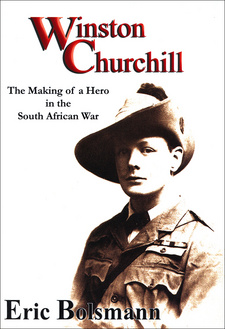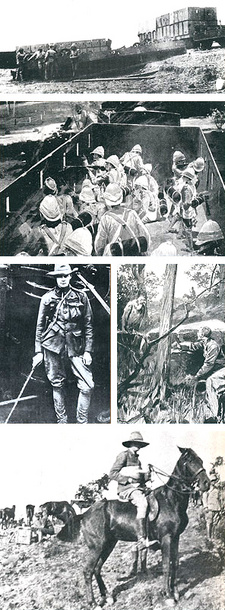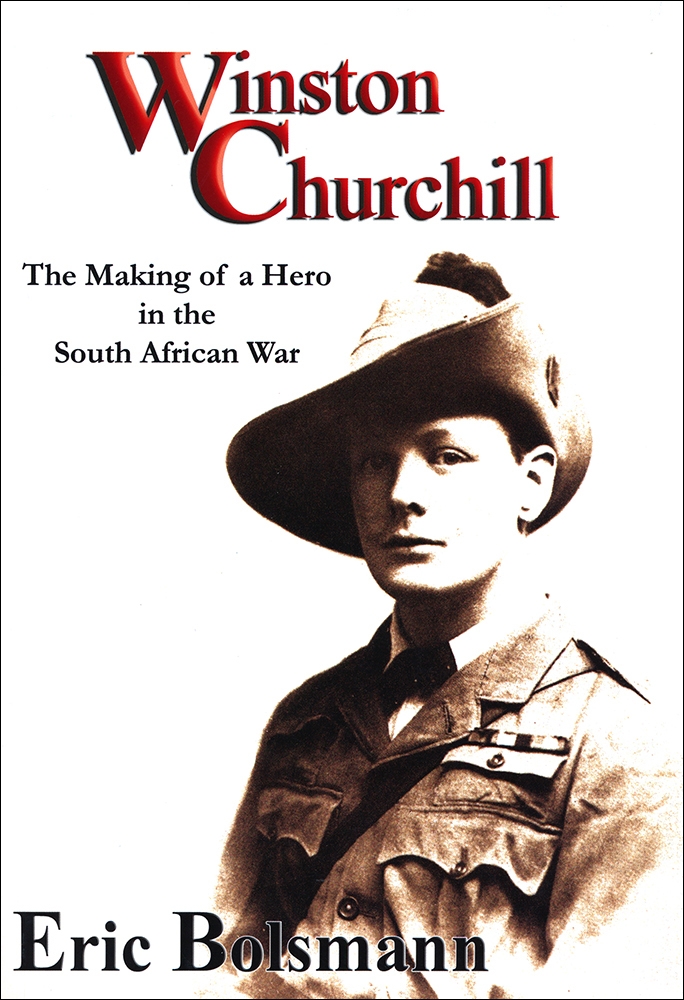Winston Churchill. The Making of a Hero in the South African War, by Eric Bolsman

Winston Churchill. The Making of a Hero in the South African War, by Eric Bolsman. Galago Publishing (Pty) Ltd. Alberton, South Africa 2008. ISBN 9781919854229 / ISBN 978-1-919854-22-9

Images from: Winston Churchill. The Making of a Hero in the South African War (Eric Bolsman. Galago, 2008)
Winston Churchill. The Making of a Hero in the South African War, by Eric Bolsman. One of the greatest talents that Winston Churchill was blessed with was his extraordinary command of the English language.
He would go on to write a prodigious 65 books in his lifetime. He was rewarded for this in 1953 when he was awarded the Nobel Prize for Literature. Yet in Britain his abilities as a writer were already widely recognised by the end of the 19th century. Yet oddly enough he had not excelled academically at school and it was only on his third attempt that he passed the entrance examination to the Royal Military Academy at Sandhurst. Before entering politics he went on to combine his military career with journalism and shortly after the outbreak of the South African War in 1899, he was contracted as a war correspondent for the Morning Post. He made his way to the Natal front where he was destined to become one of the highest-paid newspaper reporters in the world. Much has been made of Churchill's heroism. The exceptional courage he displayed when defending the derailed armoured train at Chieveley in Natal made his reputation. Yet strictly speaking as a journalist he was a non-combatant, but on his capture, the Boers treated him as a combatant because of his actions at the armoured train. This was not an isolated incident of bravery for on other occasions, in Cuba, India and in Africa, his sometimes almost reckless courage had drawn widespread comment. On three different occasions during the Malakand campaign in India, he rode his pony along the skirmish line while everyone else was ducking for cover. He admitted that his actions were foolish, but playing for high stakes was a calculated risk. 'Given an audience there is no act too daring or too noble', he wrote to his mother, and concluded his letter by saying: '... without the gallery things are different.' Scaling the ,wall surrounding the prison yard in Pretoria and making his way through enemy territory to Portuguese East Africa was not considered a particularly great feat by the British military. Yet his escape - he was largely unknown to the British people until then - was hailed by many as one of the greatest military escapes ever. His instant fame, to a large degree, came about because the war was going badly for the British Army at the time. A depressed British people needed a hero to bolster their sagging enthusiasm for the war, so Winston Churchill was their man. He had the need to stay in the limelight to fuel his political ambitions and the best way to achieve that was by returning to the front as a journalist and part-time soldier after his escape where he continued to captivate the readers of the Morning Post with his dispatches, writing convincingly about his own and other's front-line experiences. His stories of how he miraculously escaped the bullets that whistled around him in Natal and the Orange Free State and how he rode a bicycle through enemy-held Johannesburg, ending with his triumphant returned to Pretoria where he helped to liberate his former fellow POWs from captivity, earned his newspaper a fortune. The fact that the adventures he described sometimes did not happen exactly the way he related them didn't seem to bother anyone. William Manchester wrote: 'Virtually every event he [Churchill] described in South Africa, as in Cuba, on the North-West Frontier, and at Omdurman, was witnessed by others with whom recollections were consistent. The difference, of course, lay in the interpretation.' I set out to discover the real Churchill in those early years of his life. During this process I discovered many facets to this complex and controversial man. At times I felt like a certain painter described by Cervantes. This sage artist was asked, as he was starting on a new canvas, what his picture was to be. That', he replied, 'is as it may turn out.' So this, my account of how the young and extraordinary Winston Churchill became a hero during the South African War, is how it turned out.
This is the Foreword to Winston Churchill. The Making of a Hero in the South African War, by Eric Bolsman.
Title: Winston Churchill
Subtitle: The Making of a Hero in the South African War
Author: Eric Bolsman
Publisher: Galago Publishing (Pty) Ltd
Alberton, South Africa 2008
ISBN 9781919854229 / ISBN 978-1-919854-22-9
Original softcover, 17 x 24 cm, 268 pages, numerous bw- and colour photos, maps, English text
Bolsman, Eric im Namibiana-Buchangebot
Winston Churchill. The Making of a Hero in the South African War
This is a most interesting account on how Winston Churchill managed to become regarded a hero in the South African War.

